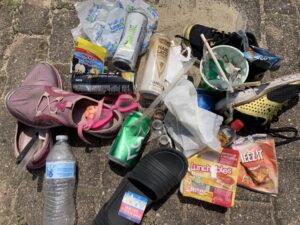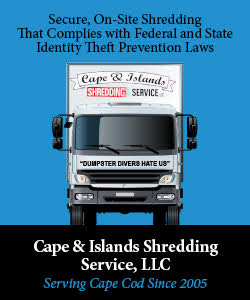CARE for the Cape and Islands and WHOI Sea Grant have been awarded a $299,999 grant to address the problem of single-use plastics used in tourism-based food and hospitality businesses on Cape Cod that contribute to marine debris.
The grant is part of the NOAA Sea Grant Program’s Marine Debris Community Action Coalitions competition supported by the Bipartisan Infrastructure Law and the Inflation Reduction Act.
 “We’re very pleased to have been selected to receive this funding, which will raise awareness of the need to transition to renewables and more sustainable alternatives,” said WHOI Sea Grant Director Matt Charette. “We believe the project will also help businesses prepare for potential future regulations of single-use plastics.”
“We’re very pleased to have been selected to receive this funding, which will raise awareness of the need to transition to renewables and more sustainable alternatives,” said WHOI Sea Grant Director Matt Charette. “We believe the project will also help businesses prepare for potential future regulations of single-use plastics.”
The three-year project will be led by CARE for the Cape & Islands in partnership with WHOI Sea Grant. Building on CARE’s well-established network of community and municipal partnerships, the project will build an action-based coalition of businesses, chambers of commerce, local governments, NGOs, educational entities, Mashpee Wampanoag representatives and others to expand the use of sustainable alternatives to single use food and serviceware, including exploring the potential for a reusable serviceware program to transition businesses away from single-use plastics.
The work leverages and expands upon previous partnerships with WHOI Sea Grant and the Wellfleet Recycling Committee which created an Alternative Serviceware Guide to provide restaurants and food service businesses with resources to find reusable and more environmentally-friendly take out containers and serviceware products.
“Addressing the problems created by single-use plastic serviceware has been a goal of CARE for some time, especially given a significant increase in take out and single-use plastic use since COVID,” explained CARE Executive Director Jill Talladay. “We couldn’t be more excited to continue our collaborative work with WHOI Sea Grant and community partners on this project to help reduce plastic in the environment.”
Along with the economic and cultural benefits that result from Cape Cod’s vibrant tourism economy, there are also significant negative environmental impacts, including the reliance on the speed and convenience of disposable food serviceware, beverage bottles, cutlery, containers, and bags to serve the large influx of visitors. When disposed of improperly, these items can make their way to the ocean, contributing to the marine debris problem. In fact, among the top debris items collected on Cape beaches in 2022 were food wrappers, plastic bottle caps, and foam cup pieces. Transitioning to reusable and compostable serviceware products will help prevent debris from entering the ocean and preserve the Cape’s valuable natural and economic resources.
“Many small businesses do not have the resources to research and make the transition away from plastic on their own,” said Charette. “Redesigning convenient food serviceware systems so they are more sustainable takes research, collaboration, and funding. We also need to test alternative systems and solutions to make sure they will work within the unique constraints and requirements of this region.”


























